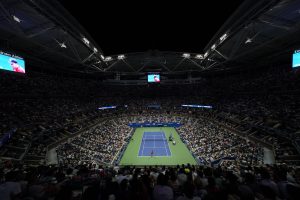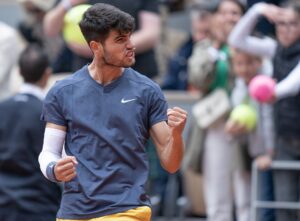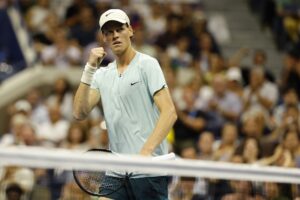When Dominic Thiem, now 26, steps on to court to face Novak Djokovic in the Australian Open final, it will be the third time that the Austrian has reached this stage at a Major. By comparison, by the time his opponent had turned 26, Djokovic had claimed six Grand Slam titles and played in a further six finals, as well as winning 18 Masters 1000 titles to Thiem’s one. Roger Federer and Rafael Nadal’s records at that age were more impressive still.
On paper then, Thiem might appear to have underachieved. But Djokovic, Federer and Nadal are not just generational talents, they are once in a lifetime sportsmen, each driven to greater heights by the others. And such is their talent, not to mention the wealth and advances in medicine that have allowed them to prolong their careers, that they have left others floundering in their wake. Andy Murray managed to win three Majors, but he lost in eight finals: three times to Federer and five times to Djokovic.
The likes of Tomas Berdych, Jo-Wilfried Tsonga and David Ferrer, who would have almost certainly won Grand Slams in another era, were never able to make more than one Grand Slam final. Is Thiem a better player than those three? Probably, but the difference may well not be as large as it looks when their respective Grand Slam and Masters haul is tallied at the end of the Austrian’s career. In the era of the Big Three, patience is key and through no fault of their own, Berdych and Ferrer simply ran out of time whilst the clock is fast winding down on Tsonga on.
But Thiem has shown, through hard work and decisiveness, that progress can be made, particularly as the powers of the Big Three begin to wane. Thiem was once thought to be a clay-court specialist, but under the tutelage of coach Nicolas Massu, he has changed his mindset and court-position, allowing him to thrive on faster surfaces. But it has been a slow process for the Austrian, who only made his first hard-court Major quarterfinal at his tenth attempt.
Of course, his formidable record on the clay courts gave him time to experiment. Successes on the ‘terre battue’ were vital in helping maintain a top ten ranking in the early part of his career, with Thiem now having numbered amongst that elite group without interruption since June, 2016. Nonetheless, his willingness to adapt and his patience in waiting for results has now set him up to provide a serious challenge to the august trio that have ruled the men’s game for the better part of the last two decades.
One suspects that neither Djokovic nor Nadal will be feeling entirely secure in their hold on their respective Australian Open and French Open titles such is the way the Austrian has been playing. Indeed, he has already beaten Nadal in Melbourne this fortnight, as well as defeating Djokovic at Roland Garros and Federer in Indian Wells, before beating both the Swiss and Serb at the ATP Finals. For Thiem, it is now surely a matter of when not if he claims his first Grand Slam.
And his example is one his younger colleagues would do well to follow. Thiem is often considered to be a peer of the NextGen stars Alexander Zverev, who he beat in the semifinals at Melbourne Park, Stefanos Tsitsipas, Daniil Medvedev and the Canadian duo of Denis Shapovalov and Felix Auger-Aliassime. But the world #5 is three years Medvedev’s senior, with the Russian the oldest member of that group. That is a significant gap.
The NextGen stars all clearly have bright futures, with Grand Slam success likely to be a feature for most if not all of them. But that will not come easily and they will suffer downturns in form. So far this year, after an excellent 2019 Auger-Aliassime has looked like he couldn’t buy a win. Daniil Medvedev, a finalist in New York, fell in the fourth round at the Australian Open whilst ATP Finals champion Stefanos Tsitsipas did not even make it that far.
Zverev, however, has enjoyed a breakout run of his own at Melbourne Park, reaching his first Major semifinal. He did so after a long period of inconsistency and struggle, which arguably reached its nadir at the ATP Cup, where the German failed to win a single match and saw his second serve abandon him. Despite this, his Australian Open result is not entirely a flash in the pan. Rather, Zverev has been making slow and steady progress at the Majors in recent years.
In 2018, he reached his first Grand Slam quarterfinal at the French Open, after scrapping through a series of five setters, and he backed that up a year later in Paris by returning to the last eight. He also made it to the fourth round at both Melbourne Park and the US Open last season. Slowly, but surely, Zverev was building a base of experience and the result of that effort was his run to the semifinal in Melbourne this season. Coincidentally, or likely not, he is also close friends with Thiem.
Main photo:
Embed from Getty Images






